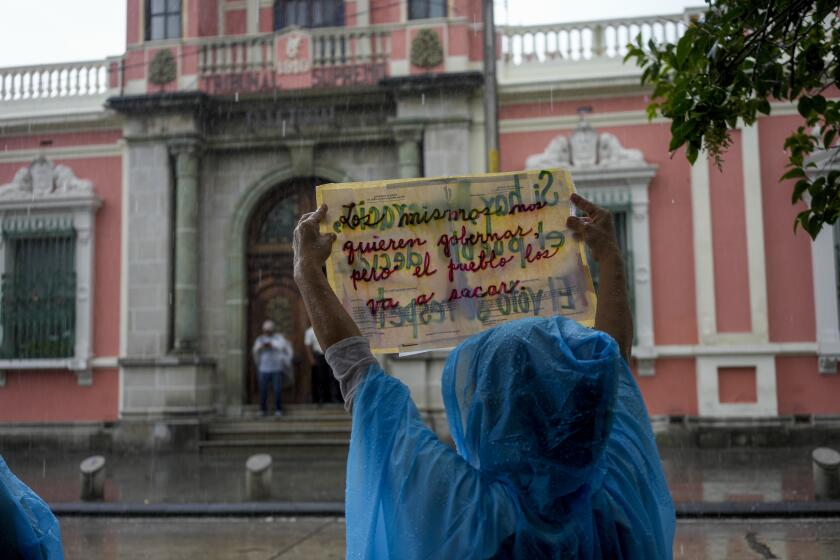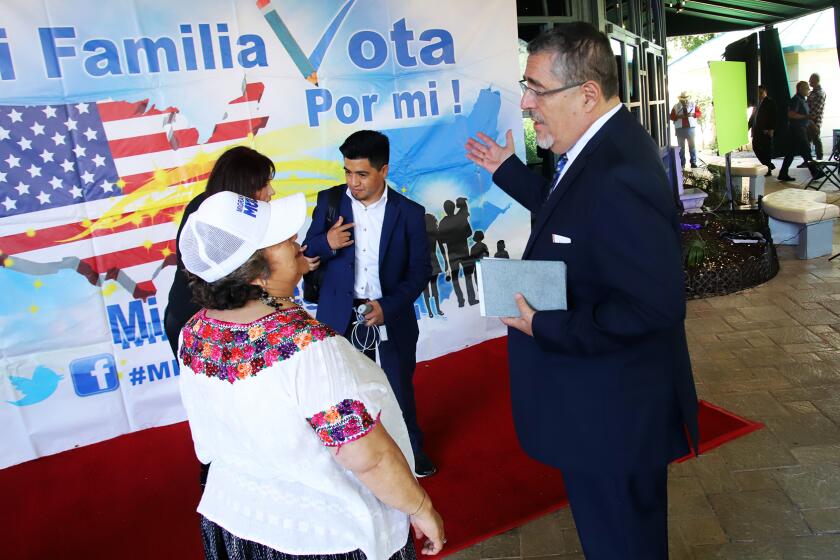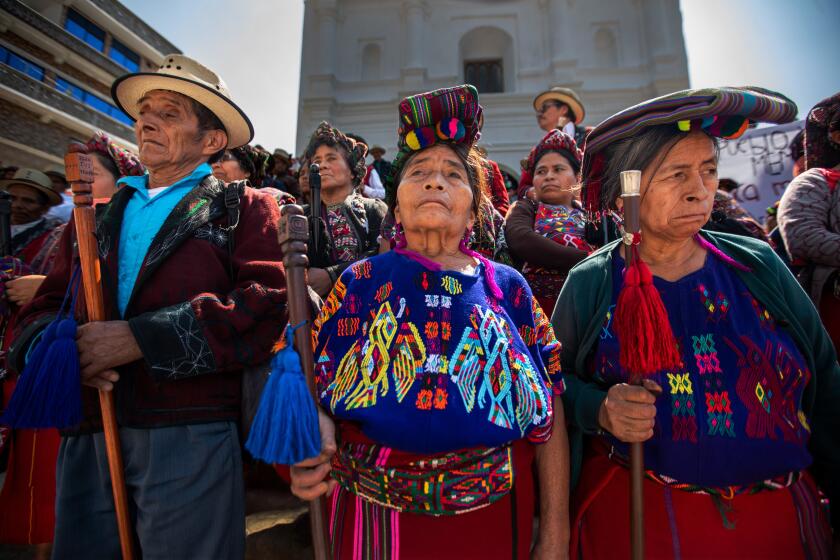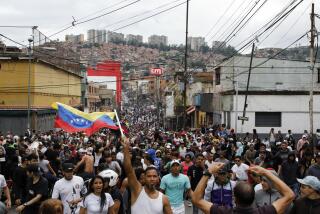Guatemala’s pick of independent anti-corruption progressive as president may face challenge
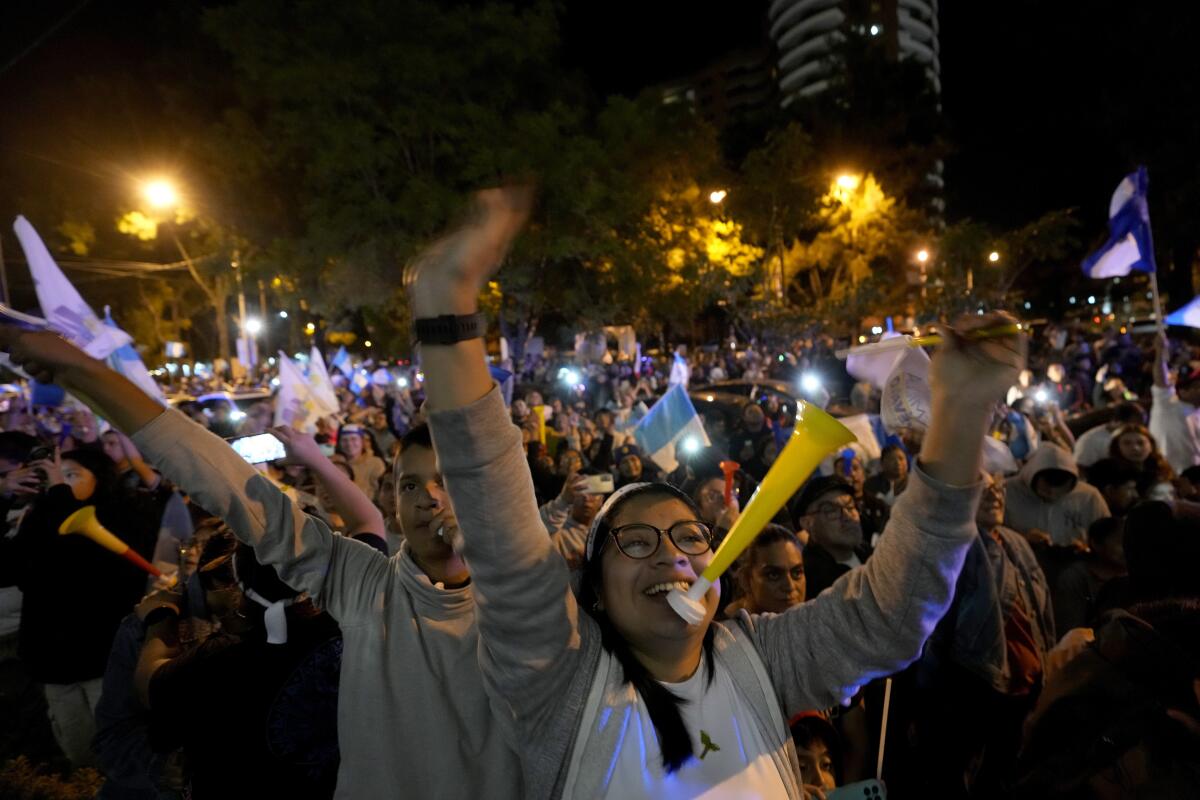
GUATEMALA CITY — Guatemalans overwhelmingly picked an independent progressive to be the country’s next president but his opponent remained silent Monday morning, leaving open the possibility of a challenge to landslide results that resoundingly rejected the country’s elite.
With 100% of votes counted, anti-corruption crusader Bernardo Arévalo got 58% of the vote to 37% for former First Lady Sandra Torres in her third bid for the presidency. The results still have to be certified to become official.
“Congratulations to the people of Guatemala following a fair and peaceful second round of elections, and to Bernardo Arévalo de León on his election,” President Biden wrote Monday on X, the platform formerly known as Twitter. “I look forward to working together to foster prosperity and security in Guatemala.”
“Free and fair elections are the bedrock of a healthy democracy,” said U.S. Rep. Norma Torres (D-Pomona), the only Central American-born member of Congress and chair of the bipartisan Central America Caucus. “The Guatemalan people have spoken, and I congratulate Dr. Bernardo Arévalo on his soon-to-be-certified victory. I applaud Dr. Arévalo for his commitment to root out corruption at all levels in the Guatemalan government and look forward to our next meeting to further discuss our shared goals.”
Arévalo said that outgoing President Alejandro Giammattei had also congratulated him, and told him that they could begin planning the transition the day after the results are certified.
“President Giammattei must now honor his pledge to carry out an orderly, peaceful transfer of power to the next administration,” Torres said. “I hope to partner with the Arévalo administration on strengthening democracy, upholding the rule of law, building a more prosperous future for all Guatemalans, and fostering a positive relationship between Guatemala and the United States of America.”
Certifying the results could be complicated by legal objections from Arévalo opponents.
“We know that there is a political persecution underway that is being carried out through the institutions and prosecutor’s offices and judges that have been corruptly co-opted,” Arévalo said Sunday night. “We want to think that the force of this victory is going to make it clear that there is no place for the attempts to derail the electoral process. The Guatemalan people have spoken forcefully.”
There have been potential legal hurdles for Arévalo. The attorney general’s office announced last month that it was investigating the signatures that Arévalo’s Seed Movement had gathered to register. A judge briefly suspended the party’s legal status before a higher court intervened.
By Monday afternoon, Torres remained silent. Her party released a brief statement late Sunday that gave no indication about whether it would challenge the results.
In the statement, the National Unity of Hope party said that it would take a “definitive position when the results are clarified with total transparency,” and was disappointed that international observers had not reviewed irregularities, without being specific.
Fearing democracy is at risk, Guatemalans are posting certified election forms on social media to show there wasn’t fraud in the presidential vote.
Guatemalan electoral authorities, for their part, said that Sunday’s vote had gone well.
The two parties’ immediate post-vote statements were key indicators of the coming path, said Eduardo Núñez, the Guatemala resident senior director for the National Democratic Institute, a U.S.-based group that works to strengthen democracies around the world.
Another key moment comes on Oct. 31, when Guatemala’s electoral process officially ends and the Seed Movement will no longer enjoy the legal protection that would keep it from being barred. Another comes on Jan. 14, when Giammattei is constitutionally mandated to leave office, Núñez said.
Alec Escobar, a 30-year-old publicist, celebrated Arévalo’s victory in downtown Guatemala City but said that he knew difficult days lie ahead.
If Torres or others do not accept the election result, or if there is official action against the Seed Movement, Escobar said, the young people who form Arévalo’s base of support are ready to act. The average age in Guatemala is 26, compared to 38 in the United States.
“Just like we protected the first electoral round, we are going to protect the country’s democracy,” he said.
Immigrants will be able to help elect the next president of Guatemala at polling stations in Los Angeles and 14 other U.S. cities
Edmond Mulet believes the power structure will attempt to sow doubt. Mulet, a former Guatemalan diplomat and president of Congress, competed in the first round of the election as the presidential candidate for the Cabal party. Prosecutors have three open cases against him and his party, in what he said was a safeguard in case he had made it to the runoff.
Mulet noted that in 2015, massive street protests pushed President Otto Pérez Molina, accused of massive corruption, to resign. Mulet now expects those in power to use legal tools to create confusion in hopes of avoiding a massive united public reaction.
“In any other country in the world, the people would have been out in the streets a long time ago, but in Guatemala there’s another solution: migration,” Mulet said. “That’s the pressure valve. Elsewhere this would have exploded already.”
Hundreds of thousands of Guatemalans have emigrated to the United States in recent years, and corruption is a major push factor for migrants.
The daughter of a Guatemalan dictator convicted of genocide is running for president, raising questions about the nation’s memory of a brutal civil war.
Perceptions among Guatemalans that the country’s political and economic elite are corrupt and in cahoots with organized crime heightened after then-President Jimmy Morales booted a highly successful U.N.-backed anti-corruption mission from Guatemala in 2019.
Since then, Morales’ administration and now Giammattei’s have taken control of the justice system and set the attorney general’s office against those who had led the anti-corruption fight. More than two dozen prosecutors and judges have fled into exile.
The U.S. government has sanctioned the attorney general and her anti-corruption prosecutor for alleged involvement in “significant corruption.”
Mulet said possible future scenarious include the Seed Movement being barred and Arévalo allowed to assume the presidency but without a party, leaving him fighting attempts from Congress to remove him from office and struggling to advance any sort of legislation.
Or the attorney general’s office could succeed in arguing that because the party was improperly registered, everything that occurred afterward, including Arévalo’s nomination, is nullified and he cannot assume the presidency.
It is entirely new legal territory, Núñez said.
Before Sunday’s results were known, Mulet speculated that a large margin of victory for Arévalo could make his opponents think twice about their next steps.
“I think they’ve been testing Guatemalans … to see if they’re going to mobilize,” Mulet said.
More to Read
Sign up for Essential California
The most important California stories and recommendations in your inbox every morning.
You may occasionally receive promotional content from the Los Angeles Times.
